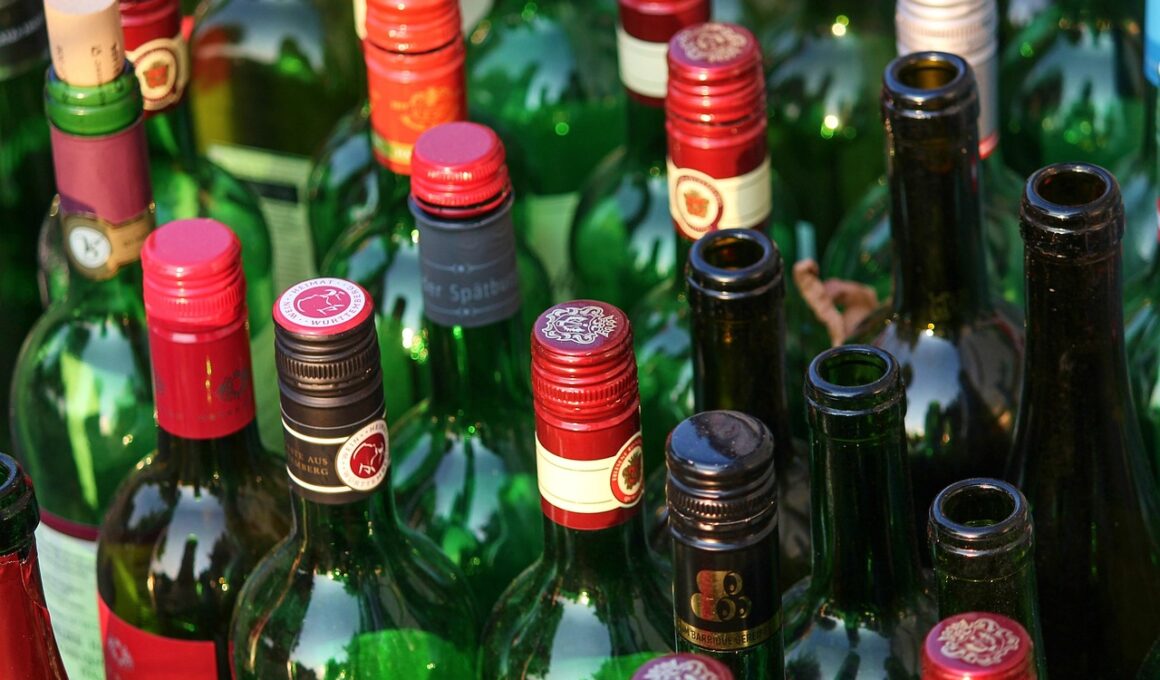Does Drinking Alcohol Affect Your Workout Gains?
Alcohol consumption can significantly impact post-workout recovery, affecting everything from muscle repair to hydration. After intense exercise, your body requires nutrients to aid recovery. However, drinking alcohol can interfere with these processes. Studies have suggested that alcohol can inhibit protein synthesis, a critical mechanism for muscle growth and repair. Furthermore, alcohol may affect hormones like testosterone, which are essential for muscle development. The resulting effect could lead to less effective workouts and diminished gains over time. Additionally, alcohol is known to dehydrate the body, which is counterproductive after exercising. Hydration is vital for optimal muscle function, joint support, and metabolism. If you consume alcohol post-workout, it’s crucial to follow it with water or electrolyte-rich beverages to restore fluid balance. Drinking can also cause poor nutritional choices later on, leading to further compromises in recovery. Moderation is key when navigating post-workout nutrition and alcohol. Always aim to prioritize high-quality foods and hydration first before considering alcohol after major training sessions or competitions. This way, you’re far more likely to support recovery and maintain workout efficiency.
The Impact of Alcohol on Hydration
Hydration plays a crucial role in post-workout recovery, and alcohol can significantly impact it. Consuming alcohol can lead to dehydration since it’s a diuretic that increases urine production. Because hydration supports recovery, impacts on the body must be taken seriously. As a result, drinking alcohol after a workout may counteract the benefits you gain from exercise. Especially post-exercise, muscles need fluids for repair and growth. To ensure optimal recovery, hydration should be a priority. When considering any alcoholic beverages after workouts, balance is necessary. It’s wise to drink water throughout the day and especially after exercising. Rehydrating can also help with soreness, muscle cramps, and overall physical comfort, which aids in performance during subsequent workouts. Furthermore, thirst can sometimes be confused with cravings. If you’re reaching for an alcoholic drink, consider whether hydration needs are skewing your choices. Drinking responsibly and knowing your limits can help. If hydration becomes an afterthought, the body’s recovery may falter while weight loss or fitness goals shift to unintended setbacks. So remember, always keep water nearby after a workout!
Another consideration is how alcohol affects sleep quality, which plays a pivotal role in recovery. High-quality sleep is essential for muscle repair and overall well-being. Alcohol, while it may make you feel sleepy initially, often disrupts sleep cycles. Poor sleep quality can hinder recovery, leading to increased muscle soreness and prolonged fatigue. Without good restorative sleep, your body can’t function optimally, making it harder to push through challenging workouts. If intense training is part of your routine, sacrificing sleep for alcohol should be avoided. Additionally, fatigue affects performance, potentially leading to injuries. Be aware of how much alcohol you are consuming after workouts or intense training. Balance is crucial; if you enjoy an occasional drink, moderation must be maintained. Integrating a healthier lifestyle involves recognizing what helps and hinders your recovery process. To support overall health and fitness goals, focus on sufficient sleep, proper nutrition, and hydration. Rethink any behaviors that disrupt these essential practices. Accepting the realities of drinking alcohol and its effects allows you to make choices that build up your gains rather than detracting from them.
Making Better Choices Post-Workout
Consider making conscious decisions regarding alcohol consumption after gym sessions or intense workouts. It’s essential to understand its effects on muscle recovery and overall performance. Instead of choosing alcoholic beverages, you could substitute them with healthier options. One great alternative is high-protein smoothies or shakes, which can enhance muscle recovery while providing necessary nutrients. They can also be crafted to taste delicious, ensuring you don’t feel deprived. Another alternative includes consuming water-rich foods such as fruits and vegetables. Foods high in water content contribute to hydration and recovery post-exercise. When planning meals later on, opt for well-balanced choices consisting of proteins, complex carbohydrates, and healthy fats. Post-workout, refueling properly ensures your body gets what it needs. It’s important to acknowledge that you can still enjoy social settings where alcohol is present without compromising your recovery. Choose to moderate your intake and pair drinks with nutritious options. Developing a healthy relationship with food and drink can support athletic performance, reflecting awareness of nutrition’s role. This approach can eventually lead to sustainable wellness habits that mesh well with your health goals.
Moreover, keep in mind the timing of your alcohol consumption relating to post-workout activities. If you work out hard, waiting a few hours before drinking can give your body the chance to recover from exercise. Limiting alcohol intake to occasions rather than daily habits can benefit your fitness journey. After workouts, your primary focus should be on recovery. If you choose to drink, assess how many drinks are reasonable while not interfering with your overall fitness goals. Planning when to drink allows for a balanced lifestyle that accommodates social interactions without sacrificing health. Consider swapping a night of heavy drinking for lower-impact activities like a relaxed dinner with friends where alcohol doesn’t dominate. As a result, you’ll still foster connections while enabling better recovery and health outcomes. Ultimately, balance and knowledge of timing around your workouts and drink choices are fundamental. Find ways to create positive practices that support your lifestyle without detracting from your gains. In the long run, this could help sustain health, fitness, and happier experiences during both exercise and social events.
Wrapping Up: Moderation is Key
In conclusion, understanding how alcohol impacts post-workout recovery may help optimize your fitness journey. While it can be tempting to indulge after a workout, the associated risks can hinder progress. Prioritizing proper nutrition and hydration is vital for effective recovery, with alcohol consumption requiring careful moderation. Recognizing that alcoholic drinks can severely impact muscle repair, hormonal balance, and hydration will help you make more informed decisions. As a fitness enthusiast, embracing a holistic approach focusing on nutrition, recovery, and lifestyle habits leads to better outcomes. This means enjoying the benefits of exercise while preventing overt indulgences that can lead to setbacks. Moreover, aiming to limit alcohol consumption, you can navigate social situations with ease while maintaining a healthy focus on your goals. Ultimately, fostering a deep awareness of your body’s needs can drive improvement in performance and recovery. The right choices yield sustainable gains over time. With that knowledge, you can appreciate the exercise journey far more fully while remaining aligned with your overall health aspirations in and out of the gym. Make a commitment to yourself to create and sustain a lifestyle that nurtures your fitness desires.
Sustainability in your fitness journey involves recognizing the effects of your lifestyle choices, including alcohol consumption, on your workouts. The path to optimal recovery isn’t solely about intense workouts; it also comes from respecting nutrition and hydration needs. By consciously integrating healthier choices into your post-workout routine, you can solidify your commitment to fitness. This strategy leads to an enhanced quality of life beyond the gym. Understand that moderation and education regarding alcohol can be pivotal tools in achieving your personal goals. Be accountable to yourself; strive for balance, considering how your choices affect overall health. Moving forward, regularly reflect on how alcohol may affect your performance. Encourage open discussions about wellness with peers, fostering a supportive community that champions healthy lifestyles. Ultimately, your power lies in choosing the best regimen that aligns with your fitness aspirations. Adopting a proactive mindset towards recovery will always yield more productive gains over time. Remain consistent in your efforts while inviting fun moments responsibly. Resisting the urge to overindulge after workouts can reshape your recovery and your physique; healthy practices endure beyond just the gym.
When it’s time to enjoy some relaxation, give thought to how you can maintain your progress while enjoying social experiences with friends. Remaining mindful of your choices strengthens your resolve. Identify when alcohol feels appropriate and beneficial or leads to potential pitfalls. Balancing social life and fitness can be challenging, yet embracing these straightforward strategies can significantly impact performance and recovery positively. Modify how you approach occasions involving alcohol, taking care to align choices with fitness objectives. Ensuring your priorities remain intact will confirm your commitment to well-being overall. To aid in this, communicate your goals to friends and family, inviting their support in promoting healthy habits. Developing strategies to enjoy social outings while minimizing any negative effects on your workouts is simply good sense. As you navigate both environments successfully, you’ll find a way to celebrate within a framework that sustains your progress. With discipline, you can find joy in social interactions while remaining true to your health initiatives. After all, life is more enjoyable when all aspects, including fitness and fun, coexist harmoniously in your endeavors.


